Parliament of the World’s Religions: Images, Quotes, and Commitments
The 2015 Parliament of the World’s Religions in Salt Lake City was an amazing and inspiring experience with people from a wide variety of religious and spiritual traditions joining together in our commitment to end hate, violence, injustice, and inequality. The Parliament theme “Reclaiming the Heart of Our Humanity: Working Together for a World of Compassion, Peace, Justice, and Sustainability” expresses our united vision. The five days of the Parliament were exhilarating but also overwhelming: there were approximately 10,000 people participating from 80 countries and 52 faith traditions, more than 70 major speakers, hundreds of workshops, numerous artistic groups, and hundreds of exhibits. The program book is 371 pages, and an accompanying commitment booklet is 39 pages.
In this blog I’m including some memorable images, quotes, and commitments.
“When we meet our Creator, we will be asked, ‘Where are your wounds?’ And if you respond that you have no wounds, the Creator will ask, ‘Was there then nothing to fight for?’” — Allan Boesak, African Dutch Reformed cleric and anti-aparteid activist
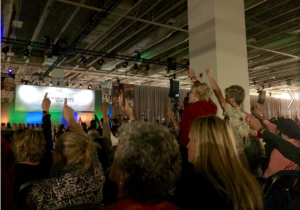
“The idea of women changing the world is a very real possibility.”—Jean Shinoda Bolen, psychiatrist, author, co-founder of The Millionth Circle initiative
“Welcome to the revolution: women are re-interpreting traditions and rituals.”—Ruth W. Messinger, president of American Jewish World Service (AJWS)
“We don’t need a revelation; we need a revolution.” —Terry Tempest Williams, on the Mormon Ordain Women movement
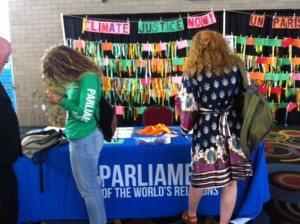 “If you are a feminist, you are an environmentalist. If you are an environmentalist, you are a feminist.” —Terry Tempest Williams, Mormon activist, author, conservationist
“If you are a feminist, you are an environmentalist. If you are an environmentalist, you are a feminist.” —Terry Tempest Williams, Mormon activist, author, conservationist
“I am not a pagan, a heathen, or a savage. I am a spiritual man.”—Chief Francois Paulette, educator, co-founder of the Dechinta Center for Research and Learning in Alberta, Canada
“We’ve been taught to pray from the neck up. We need to learn to pray with all the chakras.”—Matthew Fox, Dominican-turned-Episcopal priest/theologian
“God is a radical too.” —Teresa Edmunds, founder and president of the Mormon organization WAVE (Women Advocating for Voice and Equality)
“If commerce starts to undermine life, then commerce must stop, because life has to carry on.” — Vandana Shiva, author and environmental justice activist
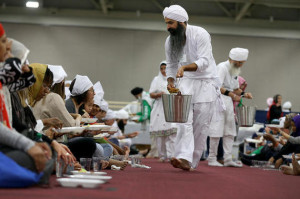
“We can either emphasize those aspects of our traditions, religious or secular, that speak of hatred, exclusion, and suspicion or work with those that stress the interdependence and equality of all human beings.”—Karen Armstrong, author, commentator, former Roman Catholic nun

“The divine goddess is not just beautiful — she is fierce!” —Marianne Williamson, spiritual author and lecturer
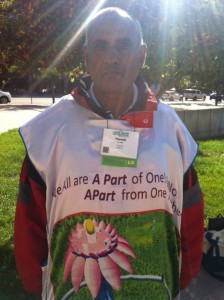 “Spirituality unites us. Religions divide us.”—Jean Shinoda Bolen, psychiatrist, author, co-founder of The Millionth Circle initiative
“Spirituality unites us. Religions divide us.”—Jean Shinoda Bolen, psychiatrist, author, co-founder of The Millionth Circle initiative
“We cannot separate ourselves from our Mother Earth.”—Rangimarie Turuki Arikirangi Rose Pere, teacher of the Kura Huna, the traditional mystery school of the Maori.
“One of the worst enemies is separation and division.”—Ilyasah Shabazz, author, community organizer, social activist, motivational speaker
“Comprehension is not a prerequisite to compassion.”—Sara Rahim, a Program Associate for the Parliament of the World’s Religions
A call to action came also in the form of a booklet challenging us to make commitments to action on the dignity and human rights of women, care of the environment, income inequality, nonviolence, and social justice for indigenous peoples. Here are some examples of these commitments:
(1) To bring awareness to the fact that the struggle for the dignity and equal rights of women is the global human and civil rights struggle of our time.
(2) Remind religious and political leaders of the abuses women suffer and what they can do to alleviate them, and encourage them to speak out against rape, sexual abuse, and all forms of gender discrimination.
(3) Recruit influential men and male religious leaders to assist in gaining equal rights for women, and encourage religious leaders and communities to advocate for the dignity and rights of women, including within religious communities.
(4) Encourage religious and political leaders to support UN agencies that advance the human rights of women, and to support national and international efforts to condemn and outlaw all forms of violence and discrimination against women and girls.
(5) To become well informed about issues connected to climate change
(6) To reduce the carbon footprint of my household, travel, and workplace.
(7) To hold programs in my organization or faith community on what we can do about climate change.
(8) To contact my policy makers to let them know of my individual and organizational concern about climate change and to call for specific actions.
(9) With the help of spiritual disciplines, to turn away from the control that greed has in our personal lives, and to live in simplicity, compassion, and generosity.
(10) Using the worldwide network of religious communities gathered at this Parliament of the World’s Religions, partner across boundaries with those who are willing to work together on economic policies that lead to the common good.
(11) Partner with religious communities and community organizations that work for justice for those who are poor in our local neighborhoods and cities.
(12) Reverse the media’s vilification of those who are poor, including those driven into poverty because of their race, caste, gender, sexual orientation, or national origin.
(13) To work with my religious community to join with other faith communities in community efforts and governmental initiatives that promote nonviolence and civil discourse as means to resolve conflict and to advance constructive change.
(14) To help my religious community to take public stands against injustice and war, and to become partners in movements that work for nonviolent social transformation.
(15) To support legislation and administrative policies at all levels of government that give priority to nonviolent means and methods for reducing and resolving conflict.
(16) To help create a component of the local, national, and global interfaith movement that will partner with the media to reduce hate, violence, and war.
(17) Reach out and connect with indigenous peoples and organizations in my region and offer support.
(18) Support indigenous-based policy changes that support social justice for indigenous peoples.
(19) Support the implementation of the UN Declaration on the Rights of Indigenous Peoples.
 (20) Encourage local, national, and regional media outlets to do in-depth reporting on more indigenous issues.
(20) Encourage local, national, and regional media outlets to do in-depth reporting on more indigenous issues.
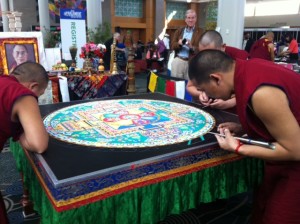
 Buddhist monks creating peace mandala
Buddhist monks creating peace mandala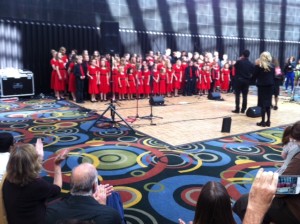


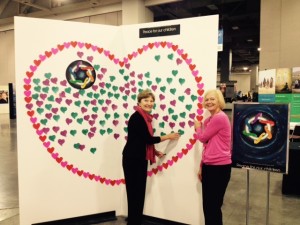



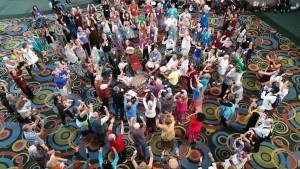
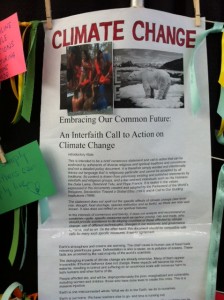
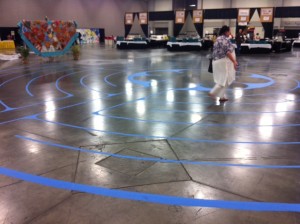
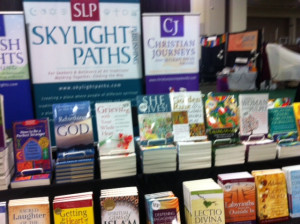

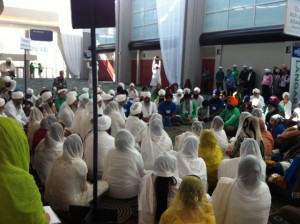
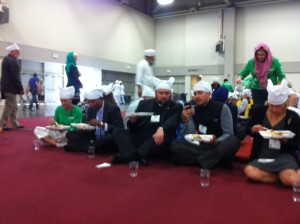
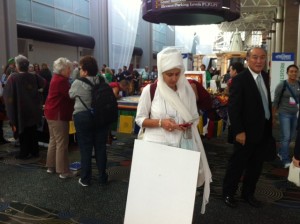
This is so great and hopefull!! The pictures are so exciting! Free Sophia!
Thank you, Colette!
Yes, Free Sophia!
https://plus.google.com/107287050579003737566/posts